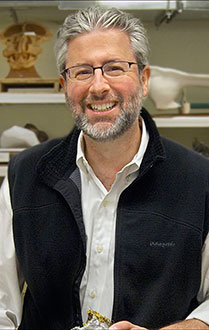Paleontologist Dives in to Human’s Fishy Past on Campus
Published: February 09, 2015 | Author: Tommy Gugino | Read Time: 1 minute
 A former PBS Host, Neil Shubin, will journey thousands of years back in history to observe the human body and its relationship to fish during his Southern Utah University Convocation.
A former PBS Host, Neil Shubin, will journey thousands of years back in history to observe the human body and its relationship to fish during his Southern Utah University Convocation.
Shubin, professor of organismal biology and anatomy at University of Chicago, will speak on Your Inner Fish: A Journey through the 3.5 Billion Year History of the Human Body, which is also the name of his 2008 award-winning book, on February 10 at 11:30 a.m. in the Gilbert Great Hall of the Hunter Conference Center.
Shubin shot to fame in 2006 when he discovered the 375-million-year-old Tiktaalik roseae fossil, which is considered to be an important evolutionary transition between fish and land animals. The announcement received worldwide media coverage and led to Shubin being named ABC News Person of the Week.
Mary Jo Tufte, SUU lecturer of biology, said of Shubin’s research, “We have so many common traits with other animals that if we take just a moment to look, to see, we can see patterns of our common past with these animals in ourselves. For biology students, as far as I am concerned [his research] is an ultimate summary of everything they're supposed to learn and take away from their biology courses in zoology.”
SUU Convocations is the distinguished lecture series on the campus of Southern Utah University, which brings together the minds of great leaders, thinkers, and innovators. Past speakers include AIDS Memorial Quilt founder Cleve Jones, former NASA Chief Scientist for Human Exploration Kathryn Clark, National Geographic Society Explorer-in-Residence Sylvia Earle, among others. For more information like SUU Convocations on Facebook and follow @SUUConvocations on Twitter.
Contact Information
435-586-5400
Contact the Office of Marketing Communication
This article was published more than 3 years ago and might contain outdated information or broken links. As a result, its accuracy cannot be guaranteed.

